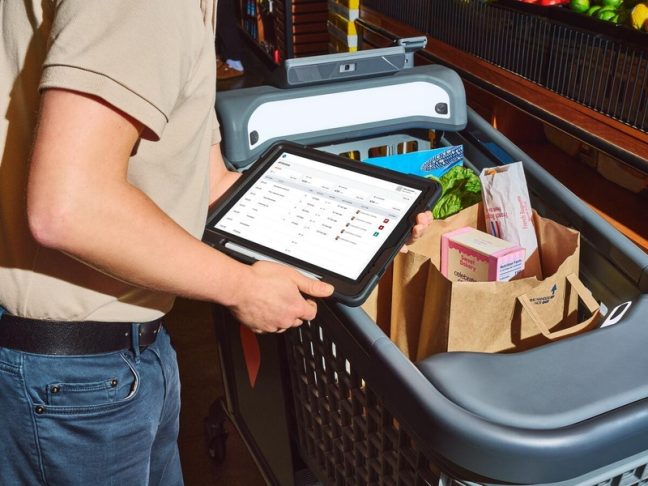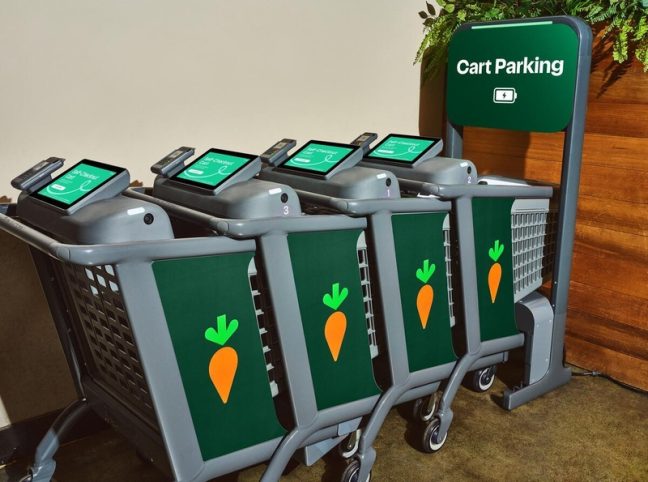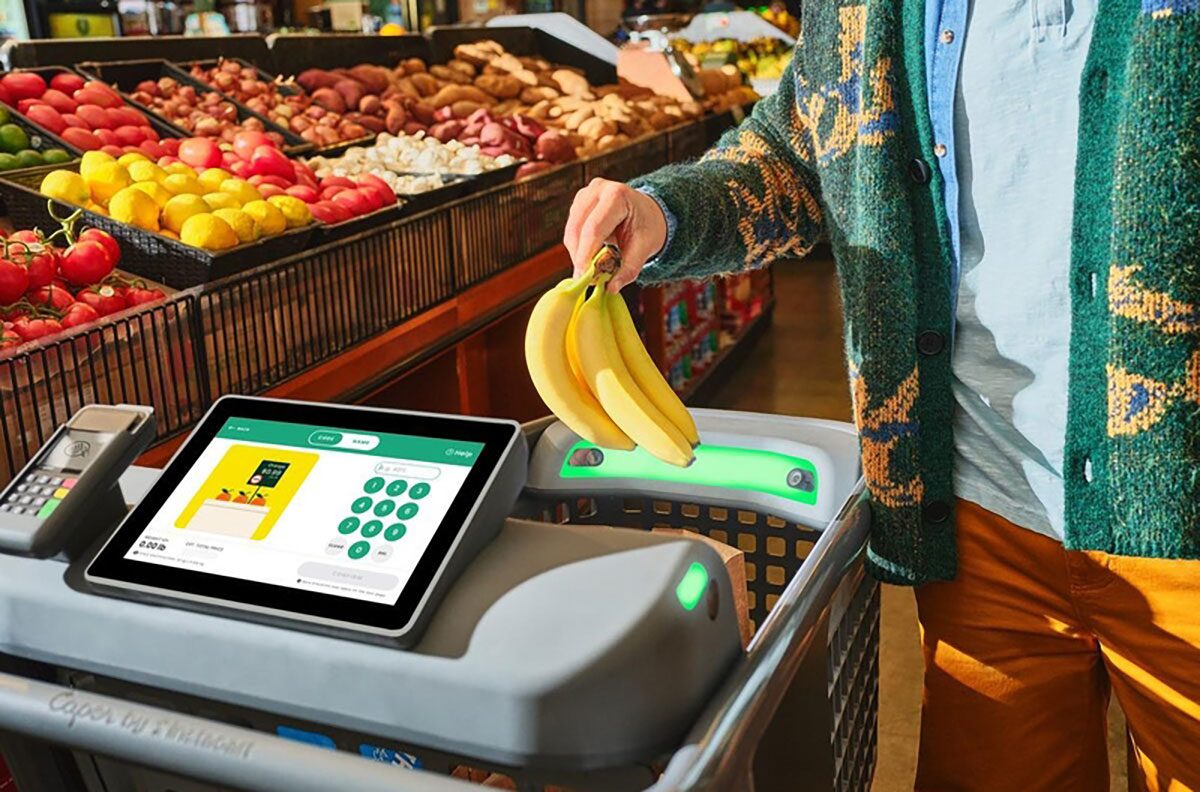Sponsored content

Nick Nickitas, general manager of local independent grocery at Instacart, sat down for a conversation with Bob Rybick, president and CEO of Geissler’s Supermarket, to discuss the strategy behind Geissler’s decision to replace a majority of their shopping carts with AI-powered smart Caper Carts, making them one of the first retailers in the U.S. to launch a dense deployment of smart Caper Carts.
A conversation on Geissler’s strategy to launch smart carts in their stores
Nickitas: Hi Bob! Thanks for sitting down with me to discuss Geissler’s vision, experience and expected outcomes of launching smart carts in your stores. I’d like to start at the beginning and ask what made you interested in smart shopping cart technology as a local independent grocer?
Rybick: As a multi-generational, independent grocer, we are focused on finding the best offerings and technology to help our customers, team members and business. With so many technological advancements now available for the grocery industry, we wanted to find something that could hit several of our strategic focuses, including:
- Enhancing the in-store experience for our customers;
- Assistance in loss prevention; and
- Helping grow revenue.
So, when we began exploring solutions to address our three strategic focuses, smart shopping carts emerged as a perfect fit. After evaluating our options, Caper Carts stood out as the most comprehensive solution.
Nickitas: Let’s dive deeper into those three strategic focuses then. How are you projecting that smart shopping carts will enhance the in-store experience for your customers?
Rybick: At launch, smart shopping carts will reduce lines and congestion in the store, creating a more enjoyable shopping experience for customers. The cart’s screen helps customers track their running total in real-time, helping them stay on budget. The screen also offers a Deals Hub – with digital coupons, aisle locations and loyalty program login to ensure we’re giving our customers all of the benefits they expect. Customers can also checkout directly on the Caper Cart with an integrated payment terminal, ensuring a seamless process. Our customers expect us to continually offer them first class in-store shopping experience and we feel implementing Caper Carts will drastically help with that.

Nickitas: One of the biggest concerns that retailers have with self-checkout experiences are with shrink/loss prevention. How do you project smart carts helping with that?
Rybick: Caper has a number of built in features that make it plug-and-play for loss prevention assistance. All together, these carts collectively have more safeguards to prevent theft than traditional self-checkout. For example, with Caper Carts specifically, the cart doesn’t just scan an item’s barcode, it recognizes it with the built-in computer vision cameras, taking into account item attributes so customers don’t scan one item, but put a different item in their basket. Additionally, the Caper Cart has a scale built-in to the bottom of the cart basket, allowing for accurate measures of weighted items. Lastly, Caper Carts have an audit system that flags carts based on our audit preferences, which are then checked by a store employee, or when notable items are added to the cart.
Nickitas: And finally, I want to talk about ROI. Most grocers are wondering how to think about profitability with smart carts. Do you expect Caper to affect your revenue growth?
Rybick: Yes, in so many ways. The engaging customer experience of the smart cart has already proven to drive a larger basket size. In addition to that, our smart carts offer gamification features, such as a “spin the wheel” feature that unlocks Caper Cart-only coupons for instant dollars off a customer’s shop. Furthermore, the cart’s screen is a new surface for the future potential of serving relevant, personalized ads directly to our customers at the point of purchase. These ads would help generate a new revenue stream that can help offset the implementation cost of smart carts.
Nickitas: Now let’s pivot to the technical side of smart cart implementation. What were your questions coming into this initiative on how it would affect your current tech stack, store operations and ongoing maintenance?
Rybick: We had many questions about this, as we aimed to ensure a seamless launch of smart carts in our stores, especially with our want to replace a majority of our carts with smart carts. Our key questions included:
- How difficult is it going to be to integrate smart carts into our catalog and POS systems?
- Would there be any technical requirements or store modifications needed?
- What does the ongoing maintenance look like for these products?
Nickitas: And what did you find to be the answers to those questions?
Rybick: The answers were a lot less cumbersome than one might think. It all came down to picking the right smart cart and the right company to partner with, for Geissler’s that was Instacart’s Caper Cart. With our chosen smart cart, integrating into our existing catalog to ensure all our SKUs would be recognized easily by the smart cart while customers are shopping was handled without issue. Our partner company integrates with all the leading POS systems in grocery, so that was also an easy check off.

Myself and the Geissler’s team were surprised at the minimal amount of technical requirements and store modifications needed to implement something as big and widely used as new shopping carts. Basically all we needed was an internet connection to get the smart carts connected and an area in the store for the carts to charge. Since regular shopping carts already have a bay, we were able to make that the charging area, as Caper Carts have the ability for nested charging. We do also have a smart cart checkout priority lane, which wasn’t a big deal to implement. We did add some in-store signage to help educate our customers on the smart carts, but the lift there was also minimal.
And lastly, for the ongoing maintenance, Instacart has remote management personnel and software for easily auditing each Caper Cart, as well as providing software updates as needed. For the physical cart maintenance, Instacart manages that ongoing, alleviating that potential stress from our teams.
Nickitas: I appreciate all you said and just have one more question. What would you tell other local, independent grocers who are considering smart cart technology for their stores?
Rybick: I think local, independent grocers have such an exciting opportunity to be the leaders in innovation in this space. The ability to be nimble and have an outsized impact on their business with new technology shouldn’t be dismissed and just because a solution or product uses AI doesn’t mean it’s out of reach for our peers. I’d tell other local, independent grocers who are considering smart cart technology for their stores that the benefits of incorporating smart carts into their short- and long-term business strategies are too great to ignore. From the customer impact, store impact and revenue opportunities through increased basket sizes and retail media network/advertising, paired with the lower than expected lift to actually launch smart carts in store, it seems to me a no brainer that smart carts should be on all local, independent grocers’ strategic radar with a push on sooner rather than later.
[RELATED: Geissler’s Launches Instacart’s Smart Carts In Stores]

Article biographies
Nickitas is the general manager of local independent grocery at Instacart, where he leads the company’s business strategy and development for these important retailers, as the company continues to build best-in-class e-commerce and fulfillment solutions for this critical segment of the grocery industry.
Prior to joining Instacart, Nickitas founded Rosie, which provided leading local grocers with websites, e-commerce and mobile apps so they could compete on a level playing field with national chains and online marketplaces. In September 2022, Rosie was acquired by Instacart.
Nickitas is currently a visiting lecturer at Cornell University, teaching entrepreneurship and strategy to graduate and undergraduate students. He also serves on the NGA Foundation Board of Regents and as chairman for the ROFDA Advisory Council.

Rybick, fourth generation president and CEO of Geissler’s Supermarkets, grew up in the family business where his passion for fresh, quality foods began as early as his teens when he started in the produce department. It was also at this time when he became determined to one day lead his generation into the future.
After completing his studies, Rybick returned to the family business working in the grocery department and becoming the buyer for newly emerging specialty categories, such as gluten free. He then transitioned to the HQ office as a buyer for center grocery and DSD, leading marketing initiatives. Rybick then moved into a general manager role prior to being voted in as the president of Geissler’s fourth generation.


well written Sommer…look forward to hearing from you on more supermaket topics!